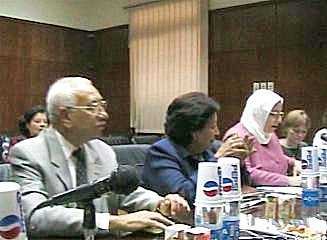Cairo University, Dialogue of Civilizations Group
24-sep-03, 1:45 pm
 We arrive at Cairo University at 1:45 PM.
At one of the many buildings
we go to a small lecture hall that has a long table at one
end and 7 or 8 rows of small writing desks facing it.
There are 6 or 7 Egyptian men and women sitting at the table with us,
and several other people sit in the nearby desks.
We exchange the usual introductions and pleasantries.
We arrive at Cairo University at 1:45 PM.
At one of the many buildings
we go to a small lecture hall that has a long table at one
end and 7 or 8 rows of small writing desks facing it.
There are 6 or 7 Egyptian men and women sitting at the table with us,
and several other people sit in the nearby desks.
We exchange the usual introductions and pleasantries.
Sam starts to give his talk about "Faces of the Enemy", but the moderator
interrupts.
One woman gets up and denounces this as a lecture rather than dialogue.
(And she does have a valid point.)
She also gives a short rant about America, ending by saying she
won't go to New York "because of the hate there."
She then stomps out.
The senior academic goes into a conciliatory talk.
(I missed his name, unfortunately.)
He is quite articulate, and he goes straight to the Palestine issue
and covers the usual ground.
He then introduces a woman who has been quietly
sitting in one of the nearby
desks, calling her "Doctor Heba". She is dressed simply and is wearing
a hejab.
(No, she is not the woman in the picture above; I unfortunately have
no photographs of "Doctor Heba".)
She joins us at the table
and opens a tiny spiral notebook, saying that she had been jotting down
a few thoughts on inter-civilization dialogue:
We are in an age of a decline in language, and "without language,
people revert to images."
In order to have identity, there must be boundaries.
"How can we build a sense of identity in a time of hybridity without
dehumanizing the enemy?"
The importance of
Image means that the role of language is declining, and
the return of language is critical to communication.
We are now at a moment of "translocality, translation,
transnationalization, and transcendance."
(She goes on to
elaborate on these "four trans", I can't possibly do this justice here.
By this point we are completely absorbed in her talk.
Her use of English is absolutely mesmerizing.)
In this time of the "four trans", we need "five re's":
-
Revision. As in re-vision, the creation of new images.
-
Reform. An understanding of what is historical and what is
innately human.
-
Re-enchantment with the world.
-
Reconciliation. To work out our grief.
-
Repentance. (This, she said, is perhaps only for the faithful.)
Our concepts of time, self, and place must change.
We should "put out bets" on the youth, for they have the best chance
of making the big changes; we should be bringing young people to
the Middle East for these dialogues.
At the end of her talk, we are so overwhelmed that we break into
spontaneous applause.
This woman is the most subtle and deep thinker that we've encountered,
and the most articulate.
My notes cannot convey any sense of her talk.
[Her name is Dr. Heba Raouf, and later googling shows that she is a
well-known and widely-published academician in the Middle East.
She is also a contrarian thinker, refusing to be branded as a "feminist".
She has several children, and later that evening I'll meet her husband.]
Several other people speak, with few surprises.
Sam points out that we're engaged in meta-dialogue, that we
still don't know anything about each other.
We need to sit down and show each other photographs of our grandchildren.
The "senior guy"
says that Egypt has a tradition of moderation that puts them in
a good position for improving America's image of Islam.
Egyptians don't like Wahhabism, or "petro-Islam".
|